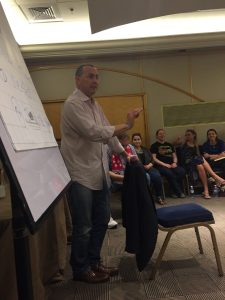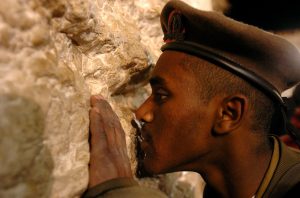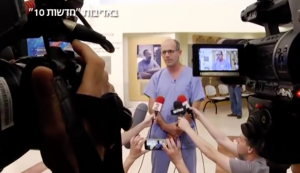Israel Reflections 2017–Trust is Optional–Last Blog of the Trip!
 Speaker Moty Cristal is always one of the student favorites and, frankly, I never know what he is going to do. Last time, he led us in an exercise learning about coalitions. This time, Moty focused on the lessons from his upcoming book chapter in the Negotiator’s Desk Reference regarding negotiation in low-to-no trust environments. As usual, the students loved him! Here is student James Wold’s assessment.
Speaker Moty Cristal is always one of the student favorites and, frankly, I never know what he is going to do. Last time, he led us in an exercise learning about coalitions. This time, Moty focused on the lessons from his upcoming book chapter in the Negotiator’s Desk Reference regarding negotiation in low-to-no trust environments. As usual, the students loved him! Here is student James Wold’s assessment.
The most memorable speaker I found in Israel was one of the last ones we had during our week. Moty Cristal is one of Israel’s leading negotiation experts and I knew it would be an interesting discussion from the moment he called himself a prac-ademic (a play on practictioner and academic). He noted that he is not exactly a practitioner, nor a pure academic in the field of negotiation. What he is, however, is undeniably brilliant and fascinating. In many ways, he tied up a lot of the issues that we were dealing with on the trip, such as conflict resolution. I find myself wanting to learn so much more from and about him.
The portion of the one-hour discussion (it was anything but a lecture) that got me to stand up and take notice was his statement that trust is not a prerequisite to negotiation and that respect of the process and freedom to hate were important. While respecting the process is something I’ve heard before, the freedom to hate aspect was a sharp departure from most of what I’ve learned regarding negotiation. In most of my learnings, it emphasized gaining the trust of the other side is vital in starting a negotiation. Although it was perhaps a bit counterintuitive, the lesson I took away on freedom to hate is that neither side must be friends at the end of the day to make a deal work, especially when resolving a conflict. Moty’s entire presentation style and infectious energy kept me engaged from beginning to end.


